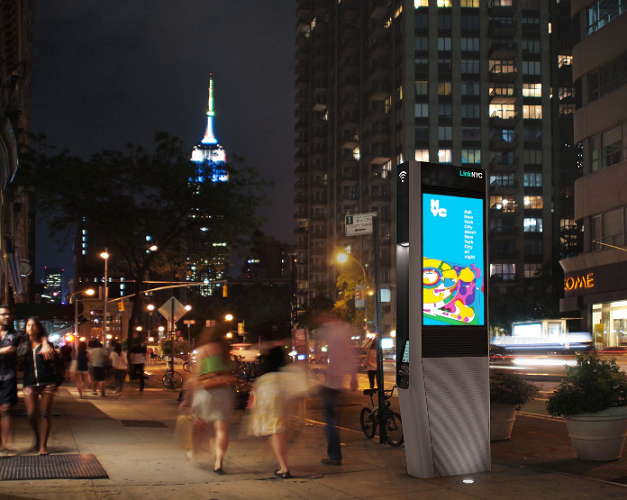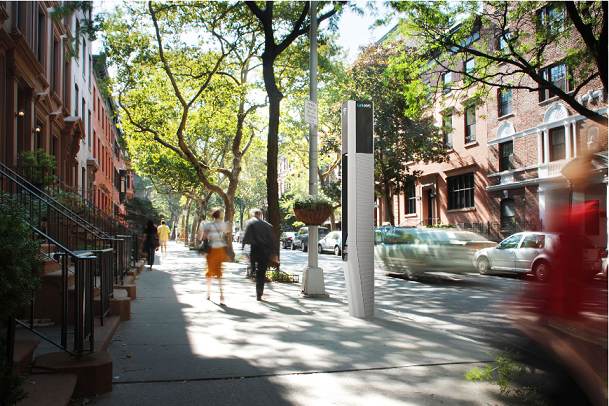NYC Free Wi-Fi Plan Isn’t Really Free: Data Collection, Advertising Space At The Heart Of CityBridge

Rule No. 1 in the “Culture of Free”: There’s always a catch. New York City officials last week announced an expansive plan to replace pay phones (remember them?) with high-tech kiosks that offer free Wi-Fi to anyone in the city. But the term “free” is a bit of a misnomer. Just like with Facebook, Google, Twitter or any number of modern-day necessities, users will pay in the end -- with their eyeballs and their data.
First the eyeballs: The plan, dubbed LinkNYC, will see the creation of 7,500 structures scattered throughout all five boroughs. Eighty percent of those structures will have advertising displays of up to 1,539 square inches -- that’s more than 9 million square inches of new ad space vying for pedestrians’ attention.
Perhaps more important, the free Wi-Fi network will generate a trove of monetizable data about what people are doing on the streets of one the world’s most cosmopolitan metropolises: their whereabouts, devices, browsing habits, search habits, scrolling behaviors. It’s all up for grabs, available to the company -- or in this case companies -- willing to bear the cost of building the infrastructure.
The project, which is subject to approval by a city review committee, will be carried out by CityBridge LLC, a newly formed corporate entity made up of four companies: the design firm Control Group, the mobile company Qualcomm, the computer display company Comark and the outdoor advertising giant Titan (which currently owns the aging pay phones). Earlier this month, CityBridge LLC entered into a 12-year, nonexclusive franchise agreement with the city to construct the kiosks and operate the network.
Smart billboards
As high-tech as the project is, CityBridge will make much of its money in a very conventional way -- by selling advertising on the side of highly visible structures. Eighty percent of the LinkNYC kiosks will contain large displays. That’s a lot of ad space to catch the gaze of the millions of people who traverse New York City streets on any given day. Just as pay phones, bus stations and subway stops have for decades, LinkNYC hot spots will double as billboards.
But unlike much of the outdoor advertising New Yorkers are used to seeing, the kiosk ads won’t be static; the screens will be able to deliver targeted messages based on a host of data sets, such as what time of day it is or how many people are in a given area, as Wired reported. Conceivably, local businesses could buy ad space on a single kiosk located on the sidewalk outside of its space, perhaps in relation to a one-day sale or promotion.

Who owns the data?
But for CityBridge, advertising is only part of the value. The other component is LinkNYC’s potential as a tool for data collection. CityBridge says it will not sell user data, and so data collection doesn’t officially factor into its business model, but its privacy policy allows it to share data with advertisers and use it to serve relevant ads.
“CityBridge envisions the data serving a strategic advantage, in that it could provide insights that might help it sell out-of-home inventory more efficiently,” said Dave Etherington, chief strategy officer of Titan.
Now consider the kind of data: A free Wi-Fi network that spans one of the world’s most populous -- and most visited -- cities will inevitably amass a wealth of currently untapped information. Tourists who don’t have international cell phone plans could log on to the network when visiting from abroad. Low-income New Yorkers who have limited or no connectivity in their homes will now have an opportunity to access a super-fast alternative.
There's nothing new about mobile advertising targeted at locations. Google and Facebook do it at scale, along with any mobile app with location services enabled. But this will add a new dataset to the mix, including the ability to discern who's a tourist visiting once and who's a commuter. Imagine knowing, for example, that German tourists are more likely to visit the Flatiron District than their French counterparts.
"Free Wi-Fi is a great place to target business travelers," said Duncan McCall, CEO and founder of ad targeting firm PlaceIQ. "If I see someone logging on in Grand Central and going downtown every day, I know they are probably a commuter and work in the Financial District. If I see them once in Times Square I'm going to assume they're a tourist."
CityBridge will own this data. The franchise agreement grants the company ownership rights of the data created through the Wi-Fi services. The city, meanwhile, will retain ownership of data related to the system’s security and other functions.
CityBridge’s privacy policy -- which restricts the use of sensitive information about its users -- is required to be consistent with municipal Wi-Fi services in other cities. For instance, the company says it won’t use “personally identifiable” information to serve ads, nor will it share that information with third parties.
New York Mayor Bill de Blasio has called LinkNYC the largest free municipal Wi-Fi network in the world, and it’s an ambitious endeavor by any measure. The structures, almost 10 feet in height, will be constructed in phases over the next eight years. Although the plan will reportedly not cost taxpayers a penny, it comes with an estimated price tag of $200 million.
So those smart billboards better be really smart.
Christopher Zara is a senior writer who covers media and culture. Got a news tip? Email me here. Follow me on Twitter @christopherzara.
Correction: an earlier version of this article misstated Dave Etherington's first name.
© Copyright IBTimes 2024. All rights reserved.






















